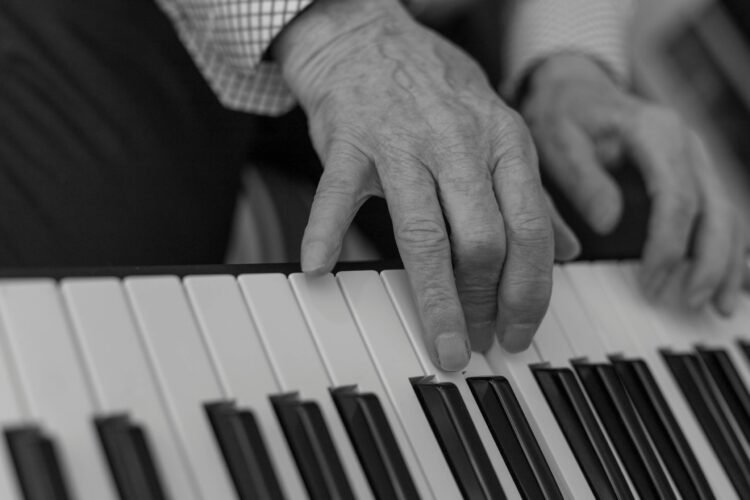Music has a profound effect on our emotions, memories, and even physical well-being. For individuals living with dementia, music therapy offers a gateway to cognitive support and improved quality of life. In this article, we delve into the advantages of music therapy for dementia patients, exploring how melody and rhythm can provide comfort, memory care, and a sense of connection even when words fail.
The Power of Music in Memory Care
Music therapy has emerged as a vital tool in memory care, with its unique ability to access different parts of the brain that are less affected by the cognitive changes associated with dementia.
A Bridge to Lost Memories
For many dementia patients, music can act as a bridge to memories that seem otherwise inaccessible. Familiar tunes can trigger the recall of past experiences and emotions, providing a sense of familiarity and comfort. This phenomenon is known as “music-evoked autobiographical memories,” and it can be a powerful way to help individuals with dementia connect with parts of their identity that the disease has obscured.
Emotional and Behavioral Benefits
Music therapy can also have a calming effect, reducing agitation and anxiety that are common in dementia patients. By incorporating their favourite songs or soothing melodies, therapists can create a tranquil environment that alleviates stress and promotes a sense of safety.
Cognitive Support Through Rhythm and Melody
Rhythm and melody have the potential to enhance cognitive function in dementia patients. Engaging in music therapy can help maintain or improve areas such as attention span, executive function, and even language skills, as patients sing along or respond to the music.
Music Therapy Techniques for Dementia Patients
Music therapy for dementia patients is more than just playing songs. It’s a structured process that involves various techniques tailored to individual needs and preferences.
Singing and Music Listening
by Wes Hicks (https://unsplash.com/@sickhews)
Singing is an interactive activity that encourages dementia patients to express themselves and engage with others. Music listening, on the other hand, can be a passive experience that still provides therapeutic benefits, such as relaxation and mood enhancement.
Instrumental Activities
Playing instruments, even simple percussion like drums or shakers gives patients a tactile experience and a sense of accomplishment. These activities can also promote motor skills and coordination.
Movement to Music
Encouraging patients to move to the rhythm can improve their physical well-being, balance, and overall mobility. Physical engagement with music can be both enjoyable and beneficial, whether it’s gentle swaying or more structured dance movements.
Integrating Music Therapy into Dementia Care
For music therapy to be effective, it must be integrated thoughtfully into a dementia patient’s care plan. Here’s how caregivers and therapists can incorporate music therapy into the daily routine.
Personalized Playlists
Creating personalized playlists with songs that have special significance to the patient can evoke powerful emotional responses and memories. Caregivers should take the time to learn about the patient’s musical preferences and history to tailor the playlist accordingly.
Consistent Schedule
Establishing a routine that includes regular music therapy sessions can provide structure and something for the patient to look forward to. Consistency also allows for the benefits of music therapy to build over time.
Collaborative Effort
Involving family members in music therapy sessions can enhance the experience for the patient. Sharing music can create moments of connection and joy for everyone involved.
Evidence Supporting Music Therapy for Dementia
The efficacy of music therapy for dementia patients is not just anecdotal; numerous studies have backed its benefits.
Research Findings
Research has shown that music therapy can improve social behaviours, reduce symptoms of depression, and even decrease the need for medication in some dementia patients. It’s clear that music has a significant impact on the well-being of those with cognitive challenges.
Case Studies
Case studies provide compelling insights into how music therapy has transformed the lives of dementia patients. By recounting specific examples, we can better understand the potential of music therapy to bring about positive change.
Overcoming Challenges in Music Therapy
While the advantages of music therapy are clear, there are challenges to its implementation.
Accessibility and Resources
Not all care facilities have the resources or trained professionals to provide music therapy. Advocacy and education are necessary to make music therapy more widely available.
Adapting to Individual Needs
Each dementia patient is unique, and their response to music therapy can vary. Therapists must be adept at adapting sessions to meet the changing needs and preferences of their patients.
The Future of Music Therapy in Dementia Care
As our understanding of dementia and the benefits of music therapy continues to grow, we can expect to see more integration of this therapeutic approach in memory care.
Technological Advancements
Technology, such as music therapy apps and virtual reality experiences, is expanding the possibilities for how music therapy can be delivered and personalized for dementia patients.
Continued Research and Training
Ongoing research and professional training are essential to refine music therapy techniques and ensure that they are based on the latest scientific findings.
Takeaways
Music therapy offers a beacon of hope for dementia patients and their caregivers. By harnessing the emotional and cognitive power of music, we can provide compassionate care that transcends the limitations of the disease. As we continue to explore and understand the advantages of music therapy, it’s clear that this modality should be an integral part of comprehensive dementia care.
Incorporating music into the lives of those with dementia not only enhances their quality of life but also reminds us of the universal language of music that connects us all, despite the challenges we face. Whether it’s through personalized playlists, interactive singing sessions, or movement activities, music therapy for dementia patients is a testament to the enduring power of melody and rhythm to heal and uplift the human spirit.
“Get trusted advice on dementia care at home and practical tips for caring for someone with dementia at home—all in one place.”




